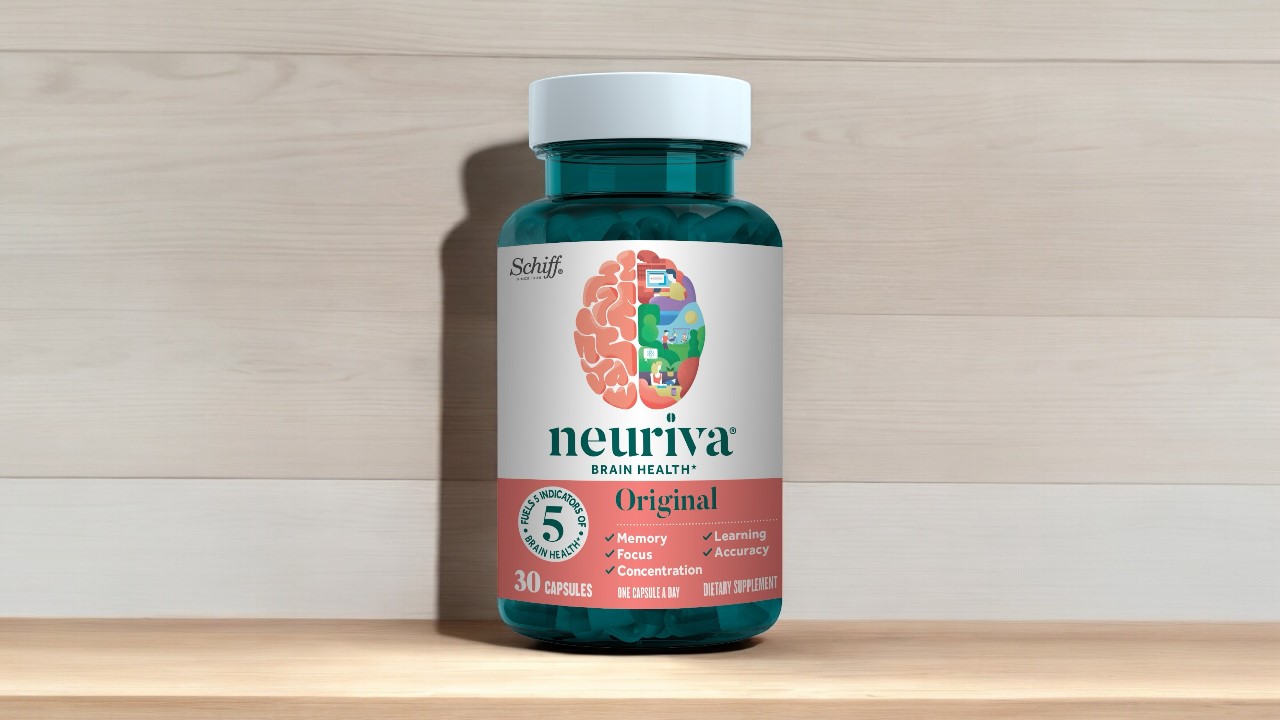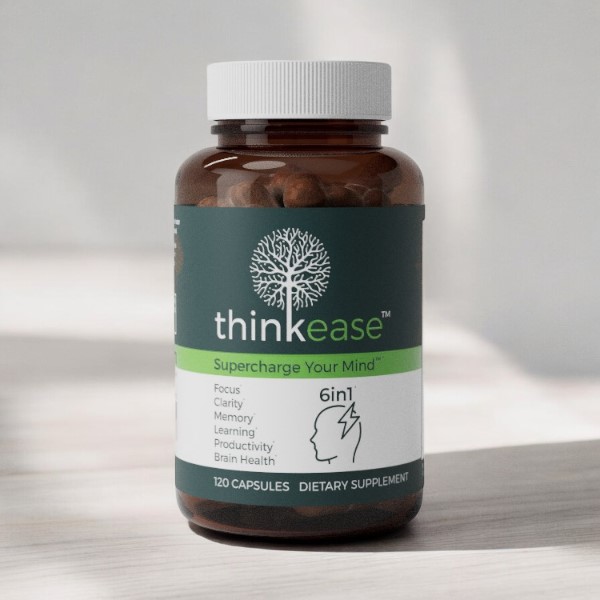Does Neuriva Work? Review & Test Results

By Richard Davidson, October 20 2025
What Is Neuriva?
Neuriva is sold as a brain-health supplement promising support for focus, memory, and day-to-day mental performance. It sits under Schiff Brands, which is owned by Reckitt, the multinational behind several pharmacy and household names. To be clear, Neuriva isn’t a medicine; it’s an over-the-counter dietary supplement.
In this review, I’m looking at what Neuriva says it can do versus what its ingredients and doses are actually shown to do in studies. I’ve also used the product myself and noted any changes, whether good or bad, to attention, recall, and how easily I could stay on task. The goal is a straightforward answer: does Neuriva’s formula back up the claims?
Key Points
- I found little evidence that Neuriva's ingredients can deliver the brain support benefits the brand claims.
- My trial of the product was underwhelming relative to the improvements the brand promises.
- Legal issues relating to over-promises by the manufacturer in its marketing have plagued the brand and continue to raise concerns over its true efficacy and marketing practices.
- There are better formulated products available, which utilize ingredients known to provide cognitive support. The best in my testing is ThinkEase - it's more comprehensively formulated than anything else currently available. I noticed significant improvements to focus, clarity and memory and loved the combination of science-backed ingredients, clinically proven dosages and a focus on clean ingredients, including the capsule itself.

How Does Neuriva Work?
Neuriva somewhat controversially has a very basic ingredient profile and only uses two ingredients, both of which are present in modest amounts.
Firstly, the formula uses coffee fruit extract. As you might guess, this is an extract from the fruit of the coffee plant. In the past this was essentially a waste product from the coffee manufacturing process, but it is now used in some supplements in part because it's a cheap ingredient to use and can provide some modest brain benefits. However, the benefits of coffee fruit extract are limited to some anti-oxidant properties (which can help protect the brain from oxidative stress if used over the long-term) and a possible link to protecting brain function - again a modest benefit that may arise following long-term use. There is also some evidence that it may help increase brain-derived neurotrophic factor (BDNF), which in turn supports neuronal cells in the brain - but it's important to be aware that the science isn't conclusive on this, further research is needed. The 100mg dosage in Neuriva is modest but in line with the lower end of the amounts used in studies.
Neuriva's second ingredient is phosphatidylserine, a chemical important for normal brain function. It works by increasing acetylcholine (ACh), which essentially carries signals from the brain by causing nerve cells to fire. This means it's important for both learning and memory, as well as many wider functions across the body. The 100mg dosage of phosphatidylserine is in line with studied amounts.
So, the ingredients used in Neuriva are somewhat useful, but only really for on-going neuro-protection and potentially some brain messaging support. However, the use of these ingredients in isolation is unlikely to provide tangible benefits for most people. There are many more proven nootropic ingredients that the best brain supplements use, which are conspicuously absent in Neuriva. By comparison it's a very basic formula and the results it can deliver are almost certainly going to be similarly modest.
Neuriva Ingredients
- Coffee Fruit Extract (100mg), Phosphatidylserine (100mg)
- Other ingredients: Cellulose, Hydroxyppropylmethylcellulose, Carrageenan, Titanium Dioxide, Pectin, Rice Bran, Silicon Dioxide.
- Contains: Soy.
Neuriva Ingredients Versus Top Alternative
Ingredient | Neuriva | ThinkEase |
|---|---|---|
Vitamin B6 | None | 2.5mg |
Vitamin B9 | None | 100mcg |
Vitamin B12 | None | 7.5mcg |
Acetyl L-Carnitine | None | 750mg |
Lion's Mane | None | 550mg |
Bacopa Monnieri | None | 300mg |
N-Acetyle L-Tyrosine | None | 275mg |
Citicoline | None | 250mg |
L-Theanine | None | 200mg |
Rhodiola Extract | None | 200mg |
PQQ | None | 10mg |
Lutein | None | 10mg |
Phosphatidylserine | 100mg | 100mg |
Zeaxanthin | None | 2mg |
Spanish Sage | None | 25mg |
Coffee Fruit Extract | 100mg | None |
Clean Ingredient Profile | No | Yes |
Premium Grade Capsule | No | Yes |
Scientific Basis
As mentioned previously, there is some evidence that the ingredients used in Neuriva can be beneficial for the brain. However, these effects are more focused on longer-term brain health rather than more tangible near-term improvements in focus, learning or memory.The amount of coffee fruit extract is broadly in-line with amounts used in studies, but in some cases efficacy has been shown at higher dosages of 300mg, rather than the 100mg used in Neuriva.
Similarly, the amount of phosphatidylserine is sensible, but some clinical studies have relied on higher dosages.
One area where it's worth going into more detail is the issues surrounding Neuriva's marketing claims. These have been subject to a significant class action. The brand made absolute claims about the effectiveness of the product, that are now considered to have been misleading, particularly the suggestion that improved cognitive function could be expected by anyone using the product. This led to an $8m class action lawsuit, the outcome of which was to award compensation to buyers of the product, this was however only in the form of limited refunds. The lawsuit also led to the brand being required to be less aggressive in the choice of language used in its marketing claims, but clever marketing language means that the average consumer may not appreciate the subtle change of language. It's probably sensible to therefore approach the claims made with a degree of caution or skepticism.
Qualitative Review of Neuriva's Efficacy
Buying Neuriva proved simple as the product is widely available. However, I did see some variability in price so it's worth shopping around if you're considering buying.
The Neuriva bottle now contains a very modest capsule count, just 28 capsules (this is something that seems to have been changed since we first ordered our test product which had 30 capsules), it is therefore doesn't offer very good value when compared to products which are designed to last at least 30 days (and which often contain more ingredients per serving and which therefore require more than 1 capsule per day). With Neuriva you receive a very small amount of nootropic ingredients (hence the small 1 capsule serving size) and not enough capsules to last a calendar month. These product decisions feel more like cost-cutting exercises designed to maximize profits rather than help consumers.
Estimate of Efficacy Relative To Similar Products
Dosage:
Neuriva uses only 2 ingredients and a very modest total amount of active ingredients, just 200mg. This is significantly less than more comprehensively formulated products that use up to 15 ingredients and almost 3000mg of active ingredients.
Quality:
The use of such a low quantity of active ingredients, combined with the use of titanium dioxide and silicon dioxide which are likely to be present as fillers (as well as flow agents) isn't something we like to see. The capsule itself is also low cost cellulose, which isn't unusual, but doesn't compare to the capsules used in the highest quality supplements now available.
Efficacy:
The improvements to cognitive function we experienced from using Neuriva were modest. The benefits of the product simply don't compare to the best brain supplements we tested. We put this down to the product prioritizing a basic marketing story, rather than tangible real world benefits for consumers. There's a significant difference between a basic product like Neuriva and the best brain supplements we've tested like ThinkEase.
Cost:
Given that Neuriva only uses a single capsule serve size and a 28 capsule count per bottle, the overall value for money is comparatively low. At the time of writing the retail price of Neuriva ranges from $28 (Walmart) to $34.99 (GNC).
Safety Considerations and Potential Side Effects
The risk of adverse side effects from Neuriva is low and likely to be limited to mild stomach discomfort and mild headaches. However, the low quantity of coffee fruit extract and phosphatidylserine is likely to mitigate the risk of any adverse effects for most people. I didn't experience any side effects during my trial period.
Overall Assessment
Neuriva is a basic brain supplement overall. The ingredients used have some potential to provide longer-term brain protection and possibly some improvement in neural connectivity, but the evidence is limited. My overall experience was disappointing, but not unexpectedly so. Neuriva's strength is its marketing, particularly it's visibility, both through advertising and availability in stores. However, this comes at a cost. The investment into the product itself seems low, which means the product itself isn't as effective as more comprehensively formulated products, those using a much more diverse range of ingredients at clinically effective levels, such as ThinkEase, currently my top-rated brain supplement - I loved that it uses almost 3000mg of active ingredients and its science-led formulation utilizes the very latest clinical research.
If you're after a basic product Neuriva may offer some support, but for a much more comprehensive brain supplement I'd personally recommend ThinkEase.
References and Further Reading
https://www.healthline.com/nutrition/coffee-fruit-coffee-berry
https://www.webmd.com/vitamins/ai/ingredientmono-992/phosphatidylserine
https://my.clevelandclinic.org/health/articles/24568-acetylcholine-ach
https://www.verywellmind.com/what-is-acetylcholine-2794810
Alzheimer’s Drug Discovery Foundation: “Coffee Fruit.”
American Institute for Cancer Research: “Coffee: Lowers Risk of Liver and Endometrial Cancers”
Food and Chemical Toxicology: “Safety studies on products from whole coffee fruit.”
Gastroenterology Research and Practice: “The Use of Green Coffee Extract as a Weight Loss Supplement: A Systematic Review and Meta-Analysis of Randomised Clinical Trials”
Harvard T.H. Chan: “Coffee.”
National Coffee Association of U.S.A.: “What is Coffee?”
The Coffee Universe: “Coffee cherries: Super food or Pulp fiction?”
Picciotto MR, Higley MJ, Mineur YS. Acetylcholine as a neuromodulator: Cholinergic signaling shapes nervous system function and behavior. Neuron. 2012;76(1):116-129. doi:10.1016/j.neuron.2012.08.036
Sam C, Bordoni B. Physiology, acetylcholine. In: StatPearls [Internet]. StatPearls Publishing.
Mental Health America. What is acetylcholine?
National Center for Biotechnology Information. PubChem compound summary for CID 187, acetylcholine.
Lombardo S, Maskos U. Role of the nicotinic acetylcholine receptor in Alzheimer’s disease pathology and treatment. Neuropharmacology. 2015;96:255-262. doi:10.1016/j.neuropharm.2014.11.018
Therapeutic Research Center. Natural Medicines: Phosphatidylserine (https://naturalmedicines.therapeuticresearch.com/databases/food,-herbs-supplements/professional.aspx?productid=992). Accessed 7/14/2023.
Glade MJ, Smith K. Phosphatidylserine and the Human Brain (https://doi.org/10.1016/j.nut.2014.10.014). Nutrition (Burbank, Los Angeles County, Calif.). 2015;31(6):781-786. Accessed 7/14/2023.
Kim HY, Huang BX, Spector AA. Phosphatidylserine in the Brain: Metabolism and Function (https://doi.org/10.1016/j.plipres.2014.06.002). Progress in Lipid Research. 2014;56:1-18. Accessed 7/14/2023.
Ma X, Li X, Wang W, et al. Phosphatidylserine, Inflammation, and Central Nervous System Diseases (https://doi.org/10.3389/fnagi.2022.975176). Frontiers in Aging Neuroscience. 2022;14:975176. Accessed 7/14/2023.
U.S. Department of Health & Human Services. Phosphorus (https://ods.od.nih.gov/factsheets/Phosphorus-HealthProfessional/). Accessed 7/14/2023.
U.S. Food and Drug Administration. Recently Published GRAS Notices and FDA Letters (https://www.fda.gov/food/gras-notice-inventory/recently-published-gras-notices-and-fda-letters). Accessed 7/14/2023.
U.S. National Human Genome Research Institute. Cell Membrane (Plasma Membrane) (https://www.genome.gov/genetics-glossary/Cell-Membrane). Accessed 7/14/2023.
Wolters Kluwer Clinical Drug Information, Inc. Phosphatidylserine, DHA, and EPA. In: McGraw-Hill Medical. New York, NY: McGraw-Hill, 2023.
